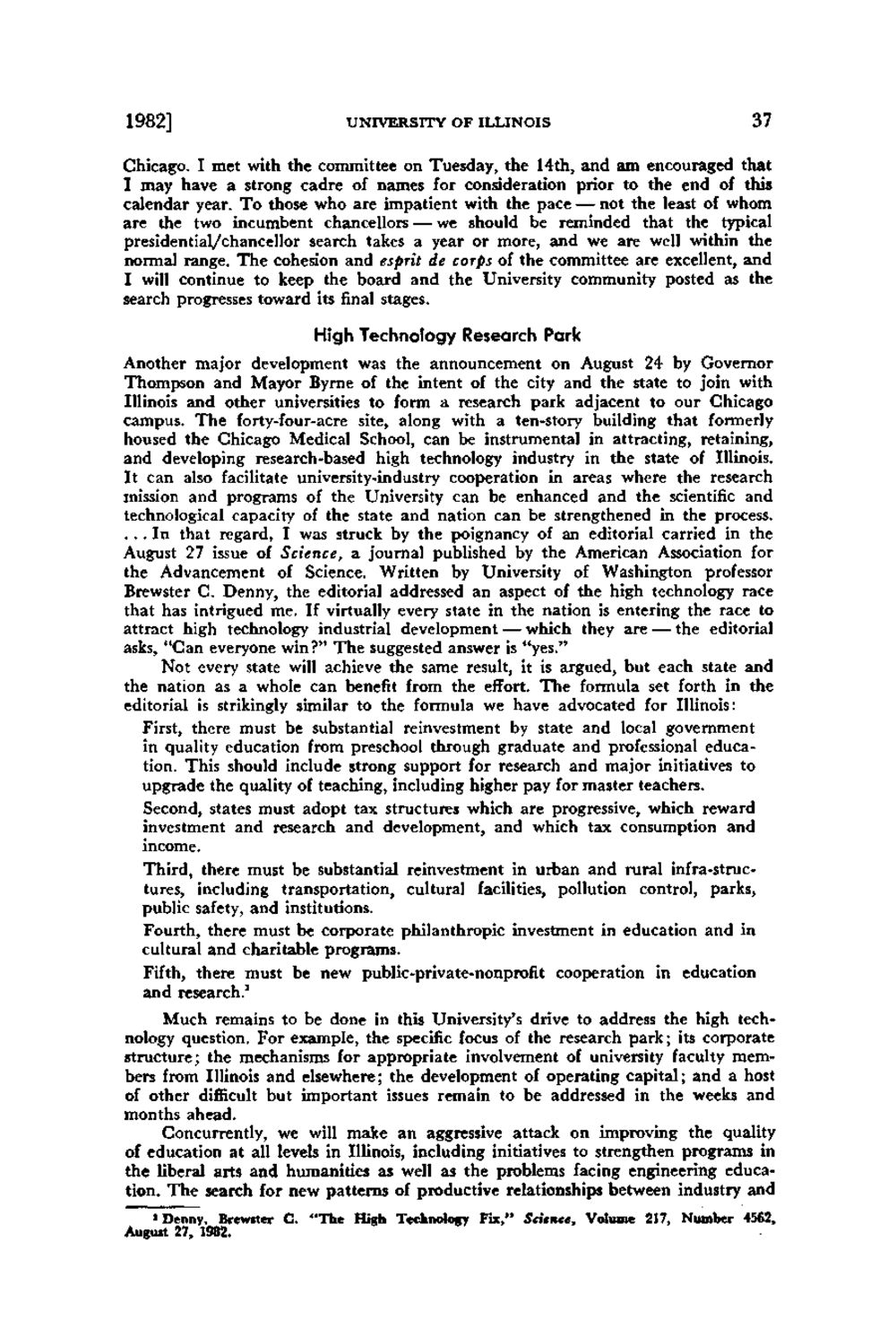| |
| |
Caption: Board of Trustees Minutes - 1984
This is a reduced-resolution page image for fast online browsing.

EXTRACTED TEXT FROM PAGE:
1982] UNIVERSITY OF ILLINOIS 37 Chicago. I met with the committee on Tuesday, the 14th, and am encouraged that I may have a strong cadre of names for consideration prior to the end of this calendar year. T o those who are impatient with the pace — not the least of whom are the two incumbent chancellors — we should be reminded that the typical presidential/chancellor search takes a year or more, and we are well within the normal range. T h e cohesion and esprit de corps of the committee are excellent, and I will continue to keep the board and the University community posted as the search progresses toward its final stages. High Technology Research Park Another major development was the announcement on August 24 by Governor Thompson and Mayor Byrne of the intent of the city and the state to join with Illinois and other universities to form a research park adjacent to our Chicago campus. T h e forty-four-acre site, along with a ten-story building that formerly housed the Chicago Medical School, can be instrumental in attracting, retaining, and developing research-based high technology industry in the state of Illinois. It can also facilitate university-industry cooperation in areas where the research mission and programs of the University can be enhanced and the scientific and technological capacity of the state and nation can be strengthened in the process. . . . In that regard, I was struck by the poignancy of an editorial carried in the August 27 issue of Science, a journal published by the American Association for the Advancement of Science. Written by University of Washington professor Brewster C. Denny, the editorial addressed an aspect of the high technology race that has intrigued me. If virtually every state in the nation is entering the race to attract high technology industrial development — which they are — the editorial asks, "Can everyone win?" The suggested answer is "yes." Not every state will achieve the same result, it is argued, but each state and the nation as a whole can benefit from the effort. The formula set forth in the editorial is strikingly similar to the formula we have advocated for Illinois: First, there must be substantial reinvestment by state and local government in quality education from preschool through graduate and professional education. This should include strong support for research and major initiatives to upgrade the quality of teaching, including higher pay for master teachers. Second, states must adopt tax structures which are progressive, which reward investment and research and development, and which tax consumption and income. Third, there must be substantial reinvestment in urban and rural infra-structures, including transportation, cultural facilities, pollution control, parks, public safety, and institutions. Fourth, there must be corporate philanthropic investment in education and in cultural and charitable programs. Fifth, there must be new public-private-nonprofit cooperation in education and research. 1 Much remains to be done in this University's drive to address the high technology question. For example, the specific focus of the research park; its corporate structure; the mechanisms for appropriate involvement of university faculty members from Illinois and elsewhere; the development of operating capital; and a host of other difficult but important issues remain to be addressed in the weeks and months ahead. Concurrently, we will make an aggressive attack on improving the quality of education at all levels in Illinois, including initiatives to strengthen programs in the liberal arts and humanities as well as the problems facing engineering education. The search for new patterns of productive relationships between industry and 1 Denny, Brewster C. "The High Technology Fix," Science, Volume 217, Number 4562, August 27, 1982.
| |